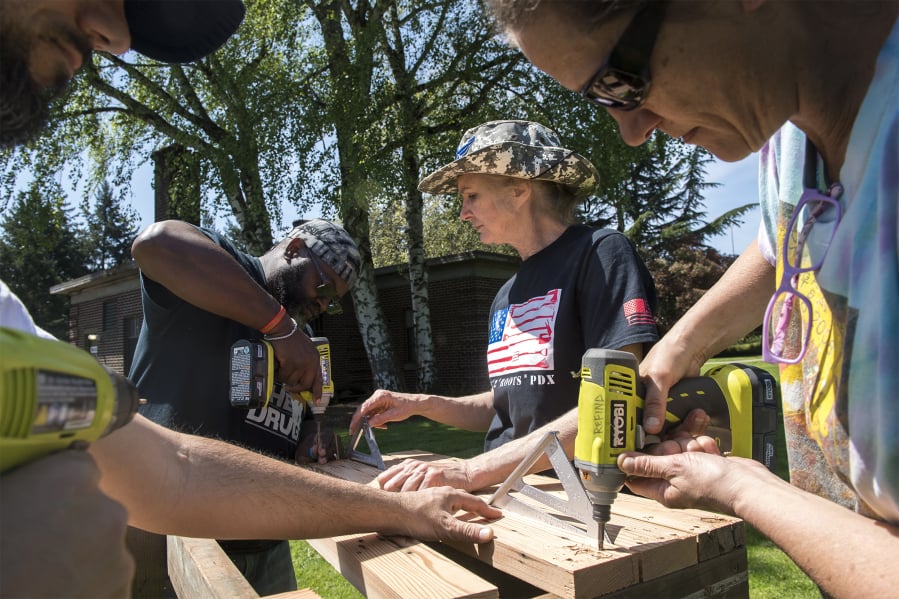Carrie Allen had to go no farther than across the street to learn about gardening while growing up in Battle Ground.
From the time she was 8 until she joined the U.S. Navy at 18, Allen would cross the street to work in her aunt’s impressive garden, which was the size of a residential lot.
“As an 8-year-old, I’m sure I wasn’t any help,” she said.
Allen, who served one enlistment as a boatswain’s mate, recently moved to an apartment in Vancouver. She could grow a few shade-tolerant flowers there, but not the sun-loving dahlias she adores — and certainly not on the scale she enjoyed in Battle Ground.
To fill that void, Allen has her eyes on the southwest corner of the VA Portland Health Care System’s Vancouver Campus.
“I can’t wait to get my hands into the soil,” she said.
Allen is one of 10 Portland-Vancouver area veterans participating in Boots 2 Roots PDX. The nine-month program is both vocational — training veterans for jobs in horticulture and farming — and therapeutic by getting them outside growing vegetables, herbs and flowers.
“You can’t write a prescription for sunshine and fresh air,” said Kelli Roesch, public affairs specialist for the VA’s Vancouver Division.
Scott Hoffman, a VA horticulturist and Boots 2 Roots PDX coordinator, said the program is part of the VA’s “Whole Health for Life” approach that emphasizes diet, exercise, sleep and social interaction, in addition to traditional medical care.
“If you grow your own food, you are likely to eat better,” he said.
Boots 2 Roots PDX is one of 10 pilot programs at VA facilities across the nation, all of which take a different approach to engaging veterans in agriculture, Hoffman said.
The local program provides 720 hours of training, 20 hours a week. It started in February with the veterans attending Oregon State University Extension Service courses to be certified as master gardeners.
Boots 2 Roots PDX partners with Mudbone Grown LLC, a Portland company that promotes urban farming and encourages people of color to farm.
Mudbone Grown works with the Oregon Food Bank to operate the nearly 1-acre Unity Farm next to the food bank’s headquarters on Northeast 33rd Drive in Portland.
“We really specialize in helping people create farm businesses,” said Shantae Johnson, program manager for Mudbone Grown.
Johnson said gardening is horticulture on a smaller scale, often in boxes or containers, while farming is larger-scale production of food grown in the ground.
Last week, veterans took the first step toward growing at the Vancouver VA campus, north of the Veterans Museum. They worked with the ReBuilding Center, a Portland nonprofit that sells used building materials at below-market prices, to construct a wash-and-pack-station for harvested vegetables and herbs.
Hoffman and Johnson will help the program’s 10 veterans grow a cornucopia of vegetables and herbs, including tomatoes, peppers, cucumbers, melons, onions and carrots.
Program participants will erect a greenhouse, to be assembled from a kit, to grow vegetables and herbs from seeds. It will include a hardening-off zone where seedlings will become accustomed to strong sunlight, cool nights, wind and rain.
Once seedlings have acclimated, they will be planted in a large in-ground plot or in raised beds 1 to 3 feet tall to allow veterans in wheelchairs to participate during upcoming “Garden Explorers” classes at the Vancouver VA campus.
Roots 2 Boots PDX participants also will work at the Veterans Community Garden in Fairview, Ore., and at the Veterans Healing Garden on the Portland VA campus. Hoffman designed the Healing Garden in 2015 to help veterans connect with nature and improve their well-being in a pleasant yet intriguing environment.
The Vancouver VA campus will include a compost area and lots of flowers to support bees and other pollinators.
Allen said she would love to see a cutting garden brimming with brightly colored blossoms, ideal for creating bouquets.
“When you take a flower away, it’s like a little piece of joy on a stick,” she said. “It’s just good for the soul.”
Raymond Malone is another one of the 10 veterans in Boots 2 Roots PDX. He spent 17 1/2 years in the U.S. Air Force as a crew chief inspecting and maintaining helicopters before a chronic back injury forced his retirement in 2014.
“I’m just another minion like the other nine,” he said. “I’ve always liked being outdoors, gardening and planting things.”
Malone grew up in western Pennsylvania, but his wife is from Brush Prairie. After leaving the Air Force, Malone and his wife decided to come to Clark County.
After three back surgeries and two fusions, Malone still manages to garden at his Orchards home, with an 80-20 split between vegetables and flowers.
“My wife has asked for a plant intervention,” Malone said. “I no longer have counter space in the garage.”
Allen said all 10 of the program’s participants have diverse backgrounds and perspectives.
“We are as different as snowflakes, so each person is going to get something different out the program,” she said. “For those who want to continue in agriculture, this is an amazing thing to put on a resume.”
Allen sees the future gardens at the Vancouver VA campus as a sanctuary to escape from the stresses of everyday life.
“This will be my happy place,” she said.




